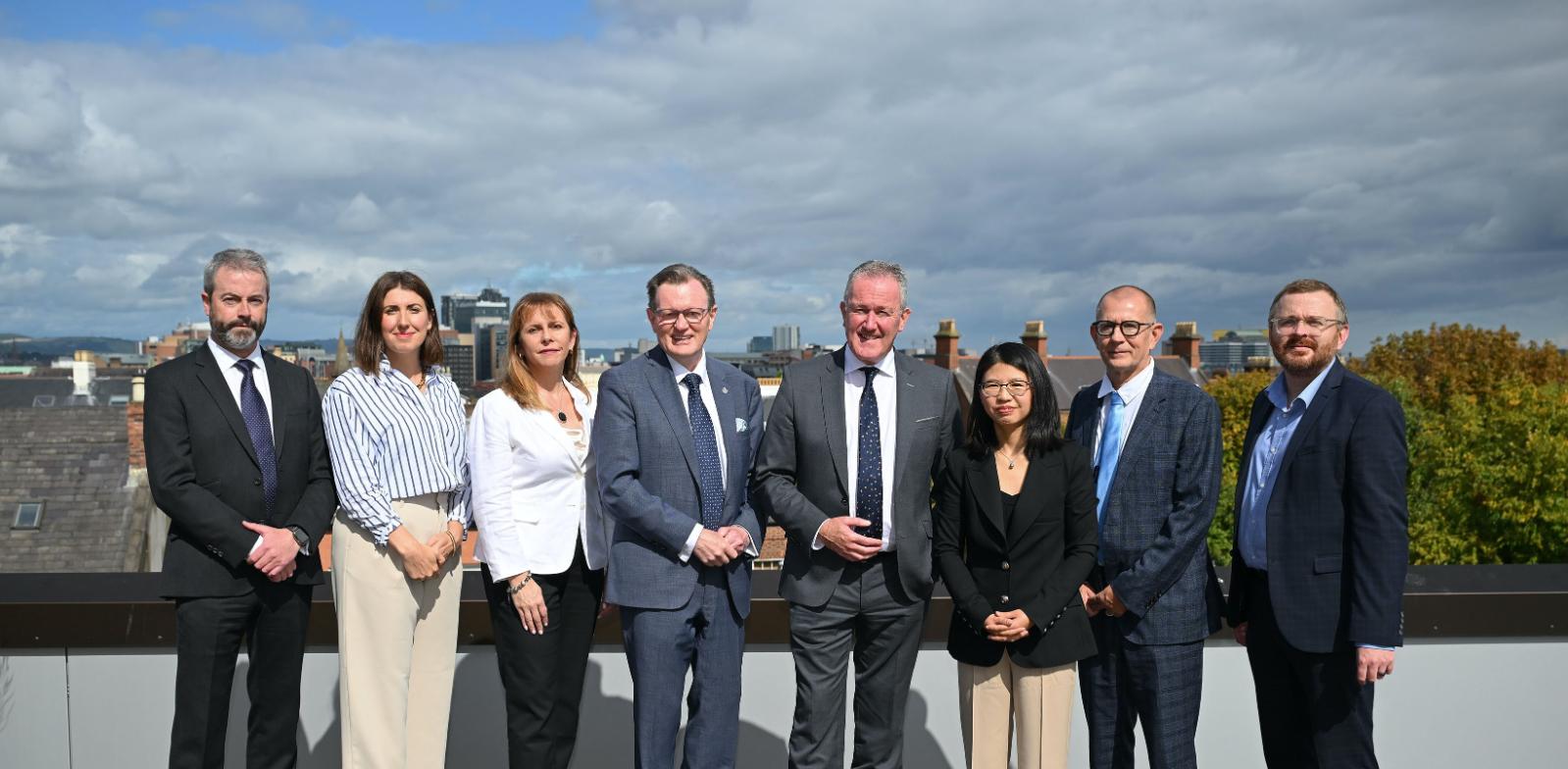Queen’s Secures £6.25m UKRI Award to Revolutionise UK Supply Chains
Queen’s secures £6.25m from UKRI to transform UK supply chains in food, minerals, and fashion, led by Dr Hangfei Guo from Queen’s Business School with engineers housed at the M1.0 Innovation Centre.

Queen's University Belfast has secured a £6.25m funding award from UK Research and Innovation (UKRI), as part of its Building a Secure and Resilient World strategic theme, to model and re-imagine supply chains across the UK in the areas of food, critical minerals, and fashion.
Modern society requires resilient and reliable supply chains for stability. With recent world events such as Covid-19 and rapid climate change highlighting weaknesses in supply chains that affect everyday lives, this work will seek to find new solutions to address the uncertainties of our times.
Led by Dr Hangfei Guo, Senior Lecturer in Supply Chain Management from Queen’s Business School, the project will be based in Momentum One Zero (M1.0), one of the data-driven Innovation Centres being delivered by the University under the Belfast Region City Deal, with the aim of driving inclusive innovation across the region.
President and Vice-Chancellor of Queen’s, Professor Sir Ian Greer said: “This award from the UKRI will be transformative in tackling supply chain resilience to ensure we future proof this critical area. This project exemplifies our dedication to fostering collaboration across the University, and with academic, industry and government partners, driving socio-economic progress in Northern Ireland and further afield.”
Economy Minister Conor Murphy stated: “Strong and resilient supply chains are vital to industry, health and our economy. The aim of this project is to build strong local supply chains, so we are more able to withstand global challenges. It is a great example of academia and business working together and supported by government to find solutions to real problems. This innovative project will draw on leading edge capability provided through one of the new City & Growth Deals investments. It will also develop knowledge and skills that will benefit our economy long beyond the life of this project. I look forward to seeing the outcome of this work.”
Principal Investigator, Dr Guo from Queen’s Business School commented: “My team and I are very excited about this fantastic opportunity. The ‘ReImagining Supply Chains Network Plus (RiSC+)’ will bring together a vast network of experts who can use their specialist knowledge to populate and render the complex systems of the UK’s fashion, critical mineral, and food supply chains. Our project will also offer evidence that exposes vulnerabilities, remedies current risks and demonstrates future potential, ultimately helping to empower the UK to move towards more resilient and secure supply chains."
The project will support collaboration with a range of partners including Ulster University, University of Derby, Nottingham Trent University, University of Plymouth, University of Reading, the College of Agriculture, Food and Rural Enterprise (CAFRE) and the Department of Agriculture, Environment and Rural Affairs (DAERA). They will work alongside regionally based companies such as Moy Park (Mid & South West), Foods Connected (North West), and Coca-Cola (Lisburn).
Additionally, there is the opportunity through a flexible fund for a wider range of companies to engage with RiSC+, embedding staff within universities to cultivate skills that can be used to create and lead new teams in industry that are not easily replicable elsewhere.
David Quinn, Executive Director of the Belfast Region City Deal at Queen’s said: “Harnessing the specialist skills of M1.0 engineers, the project will bridge the gap from academia to market realisation and unlock new value by combining the interdisciplinary expertise of academics across all three faculties at Queen’s. Supply chain resilience is a complex problem, as we have learned through Covid and climate change, which affects us all day-to-day. I am delighted to see fantastic companies from across Northern Ireland and these isles collaborating with a wide range of Queen’s experts to create new, world-leading solutions to this critical challenge.”
Professor Nola Hewitt-Dundas, Pro-Vice-Chancellor for the Faculty of Arts, Humanities and Social Sciences (AHSS) at Queen’s stated: "I welcome this significant investment from UKRI for this pivotal project, one of the largest for the AHSS faculty and Queen’s Business School. This project is reflective of the transformative impact achievable through collaboration, and I congratulate everyone involved.
NOTES
1. The project ‘Reimagining Supply Chains Network Plus’ (RiSC+) is a four-year long network plus funded by the Biotechnology and Biological Sciences Research Council, part of UKRI, as part of the Building a Secure and Resilient World strategic theme, bringing together fifteen of the UK’s leading universities; and housed at Queen’s University Belfast. The project is led by Principal Investigator Dr Hangfei Guo from Queen’s Business School.
2. About Momentum One Zero
Momentum One Zero (M1.0), a £70m project being delivered by Queen’s University Belfast under the Belfast Region City Deal, is aiming to take Northern Ireland’s successful digital economy to the next level by substantially increasing the level of digitally-driven innovation being deployed in the different industry sectors that are vital to Northern Ireland’s economic future, while initiating the new skills pathways required to meet industry needs and the jobs of the future. Significantly expanding facilities at its deep tech Innovation Centre set in the Titanic Quarter Innovation District, M1.0 will use its expertise in cyber security, advanced wireless, data & AI (Secure Connected Intelligence) to tackle complex challenges and create competitive advantage across sectors such as agri-food, life & health sciences, fintech and semiconductor security.
Media
For media inquiries regarding Momentum One Zero (M1.0), please contact Ankisha Rana at a.rana@qub.ac.uk